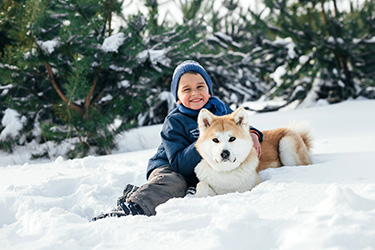5 Ways to Keep Pets Safe in the Cold Winter Months

1.) Dress for the occasion: Some breeds, like Alaskan Malamutes, or Siberian Huskies have thick winter coats that help provide insulation from the cold. However, for some animals, clothing can help them stay warm in the winter, especially those that are small with little body mass, or those with short or thin fur. Sweaters and jackets made specifically for pets can be helpful, and some pets will also tolerate booties made specifically for their paws.
2.) Take it inside: Provide pets shelter from wet, drafty and cold weather. The shelter doesn’t have to be fancy, just provide a barricade from the worst of winter while the pet is outside. The Daily Puppy states that low temperatures combined with wind chill makes your dog even colder than the temperature recorded. When he gets cold or wet, his body temperature drops, internal organs can shut down and your dog can be at risk of dying even though temperatures are above freezing. Access to an insulated doghouse, garage or shed when temperatures drop below 45 degrees Fahrenheit helps keep your dog warm. Dogs accustomed to indoor living or temperate climates should not be left outside in freezing temperatures.
For those neighborhood cats who might be lost or stuck outside, building an outdoor, insulated cat box is a nice way to keep them safe, warm and secure. Simple instructions on how to make outdoor cat boxes, like those found at the American Humane Society website, allow you to protect neighborhood furry friends at a low cost.
3.) Let it grow: Talk to your clients about how much brushing a pet should get to in the winter. A pet’s fur may need to be kept longer and thicker during the winter months. Remind clients to not let pets outside after bathing them until the animal is completely dry. Pet owners should pay attention to a pet’s feet to look out for cracks and cuts on the paw pads. Also, if clients use salt on their driveways and sidewalks, recommend a brand that is friendly to pets.
4.) Look out for winter illnesses and injuries: Frostbite, respiratory infections and consumption of toxic substances (such as de-icer and melting salt) are all dangers pets are susceptible to in the winter. If clients notice their dog isn’t behaving normally or appears to be in pain, they should seek veterinary care immediately.
Your clients will often use salt on their driveways and sidewalk to make it easier for them to travel. This type of salt, however, is dangerous and toxic to pets. Animal-friendly de-icers and ice melters are available at most local stores; be sure to recommend a variety to your client!
Running out of car fluids like antifreeze or windshield washer fluid is common during the winter months. These chemicals, especially antifreeze, are potentially deadly to animals, according to the American Humane Society. And, to make matters worse, dogs often like the taste of antifreeze! Be sure to remind your clients to keep their pets out of the garage or away from these chemicals at all times to keep them safe.
5.) Keep them active: Dogs and some cats can get “cabin fever” too! Pets who are used to running around outside when it is warm outside might need to get more of their activity inside. Hide toys or treats for your pet to find around your house, play a modified game of catch, or have them walk or run up and down stairs. Treat dispensing toys like Kongs are great tools for burning off some restless energy. Be sure to spend some time exercising their brains too; brush up on basic training or try teaching some new tricks. When exercising outside, make sure to pay attention to any signals that they may be getting too cold and make sure they have plenty of water to recover. While your time outside may have to be shorter, it can still be fun!
Sources:
http://www.wikihow.com/Keep-Dogs-Warm-in-the-Winter http://www.humanesociety.org/animals/resources/tips/antifreeze.html
http://dogcare.dailypuppy.com/undercoat-dog3257.htmlhttp://www.dailypuppy.com/articles/how-to-keep-your-outside-dog-warm-in-the-winter_1333.html
Careers
Are you looking for a place to let your talents shine? At Covetrus, we help our practitioner customers better serve their patients and take pride in providing the best customer experience possible. Search our open positions to see our available opportunities.
Newsletter
Stay current with what’s going on with Covetrus, subscribe to receive our newsletter and email communications. Subscribers will receive the latest information in practice management, sales and marketing, animal health, and more.

